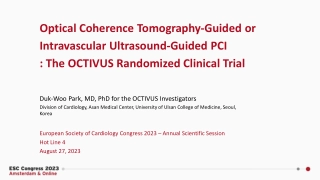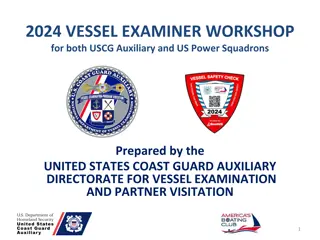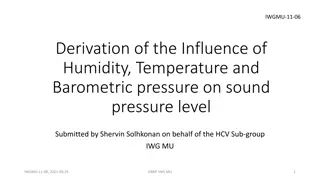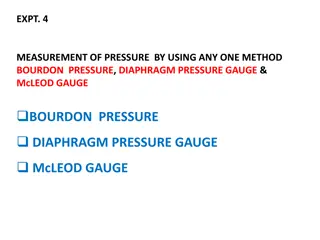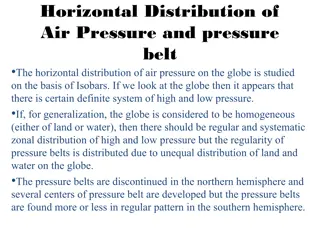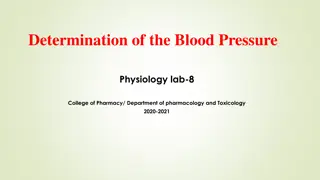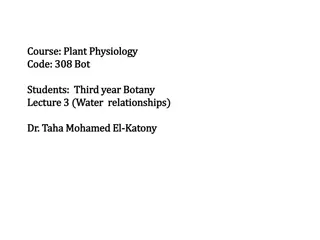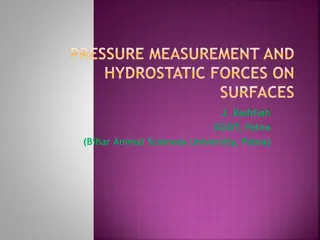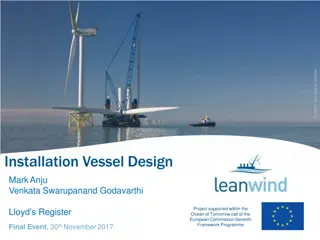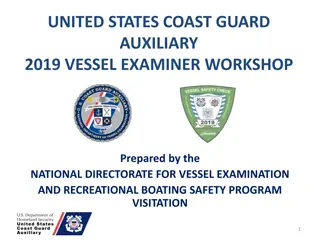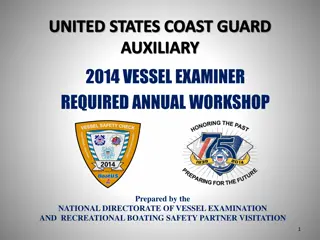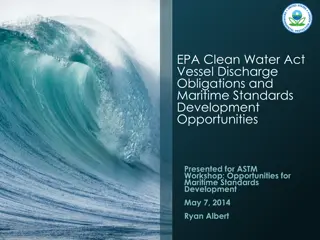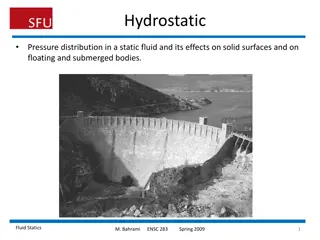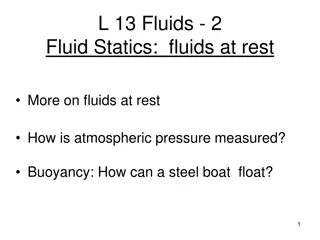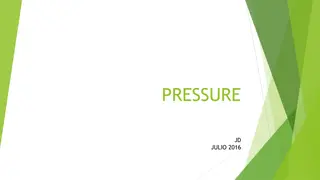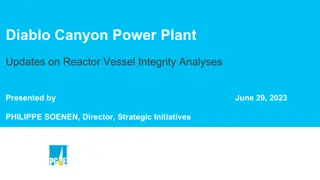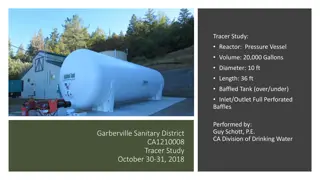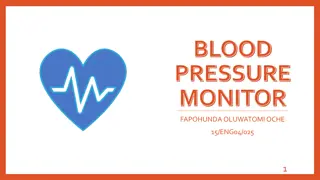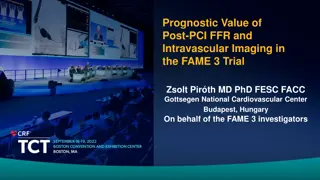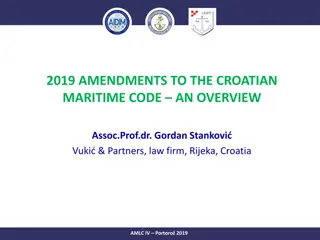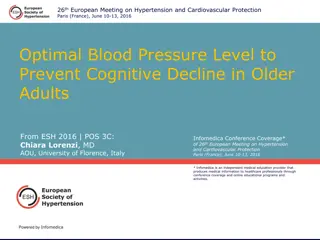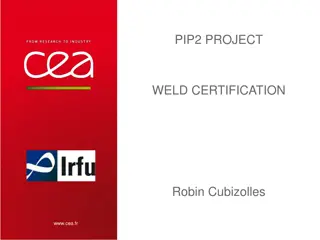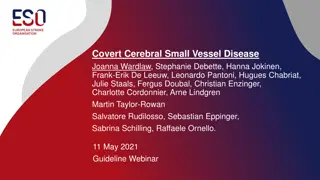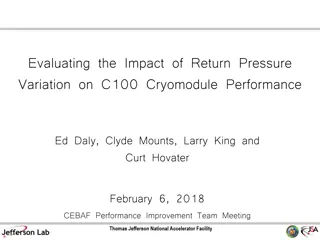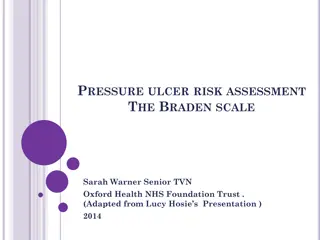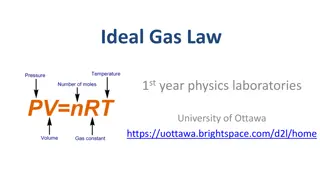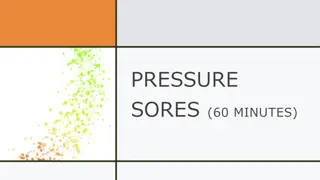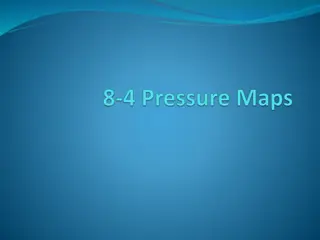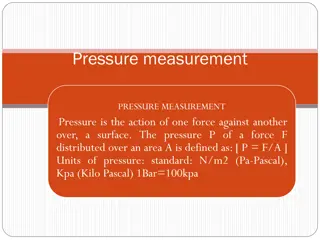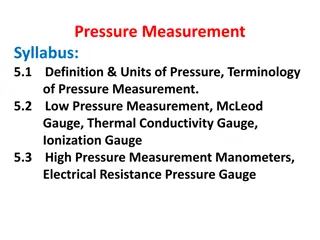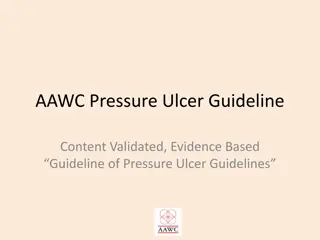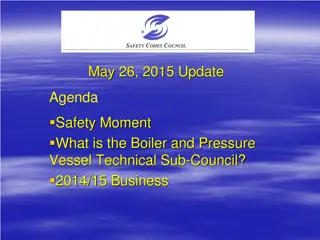OCTIVUS Randomized Clinical Trial: OCT-Guided vs IVUS-Guided PCI
The OCTIVUS Randomized Clinical Trial compared the clinical efficacy and safety of Optical Coherence Tomography (OCT)-guided and Intravascular Ultrasound (IVUS)-guided strategies in patients undergoing PCI for significant CAD. The study aimed to determine if OCT-guided PCI is noninferior to IVUS-gui
8 views • 27 slides
2024 Vessel Examiner Workshop - Guidelines for Vessel Safety Checks
The 2024 Vessel Examiner Workshop provides essential guidance for both USCG Auxiliary and US Power Squadrons Vessel Examiners. Topics covered include safety considerations, workshop requirements, and the importance of education over enforcement in conducting Vessel Safety Checks. The workshop emphas
7 views • 30 slides
Understanding Fluid Pressure in Oil Field Hydraulics
Explore the fundamentals of fluid pressure including pressure basics, unit conversion, fluid weight constants, true vertical depth, and hydrostatic pressure in the context of oil and gas technology programs. Learn how to calculate pressure gradients, understand the impact of fluid density on pressur
1 views • 40 slides
Influence of Environmental Factors on Sound Pressure Levels
In this study, the relationship between sound pressure, particle velocity, and the acoustic impedance is explored in the context of varying humidity, temperature, and barometric pressure. The ideal gas law is used to determine the density of both dry and humid air, considering parameters such as par
1 views • 14 slides
Measurement Methods for Pressure Evaluation
The content describes the measurement of pressure using various methods such as Bourdon pressure gauge, diaphragm pressure gauge, and McLeod gauge. It explains the principle of McLeod vacuum gauge, the operation of the gauge, and the components involved. The McLeod gauge works by compressing a known
2 views • 27 slides
Understanding Horizontal Distribution of Air Pressure and Pressure Belts on the Globe
The horizontal distribution of air pressure and pressure belts on Earth is characterized by isobars, indicative of high and low pressure systems. The regular zonal distribution of pressure belts is affected by the uneven distribution of land and water. Pressure belts are not solely induced by temper
1 views • 7 slides
Understanding Blood Pressure Physiology in a Lab Setting
Blood pressure (BP) is the lateral pressure exerted by the column of blood on the artery wall. This lab aims to determine BP at rest and after exercise using a sphygmomanometer and stethoscope. Learn about systolic and diastolic pressures, pulse pressure, and mean arterial pressure. Methods include
1 views • 17 slides
Understanding Root Pressure in Plant Physiology
Root pressure is the pressure developing in xylem vessels due to metabolic activities of the roots. It is an active process driven by osmotic mechanisms and the absorption of salts by the roots. This pressure plays a key role in translocation of water, affecting factors like respiration, exudation r
1 views • 20 slides
Understanding Pressure Measurement and Hydrostatic Forces on Surfaces
Measurement of pressure using various gauges like Bourdon and Diaphragm Gauge, different types of pressure gauges like Bellows and Dead Weight Pressure Gauge are discussed. Piezometer and different types of manometers for pressure measurement are also explained. Additionally, the concept of hydrosta
2 views • 11 slides
Understanding Pressure in Physics and Daily Life
Explore the concepts of force, pressure, and liquid pressure in physics, and how they relate to daily life scenarios. Learn about the relationship between force and pressure, the effects of surface area on pressure, and the application of pressure in everyday objects. Discover the significance of li
0 views • 13 slides
Colligative Properties in Solutions: Vapor Pressure, Freezing Point Depression, and Osmotic Pressure
Colligative properties such as vapor pressure lowering, freezing point depression, and osmotic pressure are characteristics of solutions that depend on the number of solute particles present. This text explores how these properties are related to the concentration of solute in a solution and how the
0 views • 14 slides
Understanding Atmospheric Pressure Variations at Different Altitudes
Atmospheric pressure varies with altitude due to the weight of the air column above. This activity explores how Otto von Guericke's experiments with vacuum systems demonstrate the power of air pressure. Theoretical concepts of atmospheric pressure are discussed, highlighting its relation to gravity
0 views • 28 slides
Understanding Pressure and Designing Objects to Alter It
Pressure is a crucial aspect of physics, and this content delves into the concept by comparing scenarios where a woman in stiletto heels or an elephant exerts pressure on the ground. It explains pressure calculation, discusses how objects designed to decrease or increase pressure work, and challenge
0 views • 22 slides
Cutting-Edge Installation Vessel Designs and Challenges in Offshore Wind Farms
Explore innovative vessel designs utilized in offshore wind farm installations, along with challenges faced in the industry. Discover key partners, vessel concepts, operational phases, and strategies to enhance efficiency and reduce costs. Overcome obstacles related to turbine installation, weather
0 views • 20 slides
United States Coast Guard Auxiliary Vessel Examiner Workshop 2019
The United States Coast Guard Auxiliary conducted the 2019 Vessel Examiner Workshop focusing on the Vessel Safety Check (VSC) program, the importance of becoming a Vessel Examiner, workshop objectives, general information for Vessel Examiners, and VE currency requirements. The program aims to promot
0 views • 48 slides
United States Coast Guard Auxiliary 2014 Vessel Examiner Workshop
The United States Coast Guard Auxiliary's 2014 Vessel Examiner Workshop focuses on educating Vessel Examiners to enhance boating safety and ensure compliance with safety regulations. The workshop covers VSC procedures, conducting safety checks, and operational facilities for paddle crafts. It includ
1 views • 111 slides
United States Environmental Protection Agency (EPA) Clean Water Act Vessel Discharge Obligations Overview
Brief overview of the Clean Water Act (CWA) requirements for vessel discharge obligations under the National Pollutant Discharge Elimination System (NPDES) permitting program. Includes details on the Vessel General Permit (VGP), permit coverage, discharge types, effluent limits, and implementation s
0 views • 18 slides
Understanding Hydrostatic Pressure in Fluid Statics
Explore the distribution of hydrostatic pressure in static fluids and its influence on solid surfaces, floating bodies, and submerged bodies. Learn about the equilibrium between pressure gradient and gravity force, along with concepts like gage pressure and vacuum. Discover how pressure varies in fl
0 views • 24 slides
Understanding Fluid Statics and Atmospheric Pressure Measurements
Exploring the concept of fluid statics, this content delves into topics such as how atmospheric pressure is measured, buoyancy, and why a steel boat can float. It covers the measurement of pressure, the relationship between pressure and depth in fluids, and demonstrations showcasing these principles
0 views • 24 slides
Understanding Barometric Pressure and Its Impact on Altitude
Barometric pressure, also known as atmospheric pressure, is the force exerted by the weight of air on a specific area and varies with altitude. This pressure is crucial in various industries, such as cement production at high altitudes. Learn about how to calculate barometric pressure, its relation
0 views • 37 slides
Diablo Canyon Power Plant Reactor Vessel Integrity Analyses Update
Updates on Diablo Canyon Power Plant's reactor vessel integrity analyses were presented by Philippe Soenen, Director of Strategic Initiatives, on June 29, 2023. The analysis includes background information, reactor vessel surveillance coupon withdrawal plans, and the request for Nuclear Regulatory C
0 views • 9 slides
Tracer Study for Reactor Pressure Vessel: Overview
Detailed information about a tracer study conducted on a reactor pressure vessel with a volume of 20,000 gallons. The study includes data on the vessel's dimensions, baffling configuration, tracer test results, sample locations, analysis methods, and more. Insights into the tracer test purpose, disi
0 views • 16 slides
Understanding Blood Pressure Monitoring
Blood pressure monitoring is essential for maintaining overall health. This article explores the significance of blood pressure, the importance of monitoring it, and the methods used to measure blood pressure. It also delves into the clinical need for accurate blood pressure monitoring devices and t
0 views • 22 slides
Prognostic Value of Post-PCI FFR and Intravascular Imaging in FAME 3 Trial
This study investigates the prognostic value of measuring post-PCI Fractional Flow Reserve (FFR) and intravascular imaging in patients with complex 3-vessel coronary artery disease (CAD), focusing on the impact on outcomes such as target vessel failure (TVF), including cardiac death, target vessel m
0 views • 15 slides
Overview of 2019 Amendments to the Croatian Maritime Code
The 2019 amendments to the Croatian Maritime Code aimed to enhance the competitive strengths of Croatian shipping, improve seafarers' positions, reduce administrative barriers, digitize the shipping sector, and harmonize with EU legislation. Key topics covered include vessel definitions, safety, sea
0 views • 15 slides
Optimal Blood Pressure Levels to Prevent Cognitive Decline in Older Adults
Observational study at the 26th European Meeting on Hypertension suggests maintaining high-normal levels of systolic blood pressure between 130-145 mmHg may reduce cognitive decline and mortality risk in older adults. The complex relation between blood pressure and cognitive impairment is explored,
0 views • 9 slides
Certification and Standards in Pressure Equipment: Robin Cubizolles PIP2 Project
In the PIP2 Project led by Robin Cubizolles at CEA, certification and adherence to specific codes and standards are crucial for the design and manufacturing of pressure equipment. Directives such as the PED 2014/68/EU guide the design process, with standards like EN 13445 and EN 13458 ensuring compl
0 views • 15 slides
Expert Guidelines on Treatment of Small Vessel Disease
Expert recommendations for the management of covert cerebral small vessel disease (ccSVD) emphasize the use of antihypertensive treatment for hypertensive patients to prevent SVD lesion progression. While there is limited evidence supporting intensive blood pressure lowering targets, systematic bloo
0 views • 14 slides
Impact of Return Pressure Variation on C100 Cryomodule Performance
The performance of SRF cavities, specifically the C100 Cryomodule (CM), is influenced by the local surface resistance, bulk Nb temperature, and pressure variations. This study evaluates how return pressure variation affects the heat transfer limitations within the C100 CM, impacting cavity performan
0 views • 13 slides
Understanding Pressure Ulcer Risk Assessment with the Braden Scale
Pressure ulcer risk assessment is crucial in healthcare settings to identify individuals at risk of developing pressure ulcers. The Braden Scale, developed in 1984, evaluates six key elements contributing to pressure ulcer development. It provides a standardized method for assessing risk levels base
0 views • 20 slides
Investigating Ideal Gas Law: Pressure, Temperature, and Volume Relationship
Explore the relationship between pressure, temperature, volume, and number of gas molecules in a closed system through an experiment based on the Ideal Gas Law at the University of Ottawa's first-year physics laboratories. The experiment aims to determine if air behaves as an ideal gas and find the
0 views • 13 slides
Understanding Pressure Sores and Preventive Interventions for Bedridden Patients
Pressure sores, also known as pressure ulcers, are localized areas of tissue necrosis caused by prolonged pressure on skin and soft tissues. This can lead to serious complications, especially in bedridden patients like a 76-year-old man following a stroke. Preventive interventions include relieving
0 views • 26 slides
Enhancing Boating Safety Through Vessel Examiner Training Programs
Engage in boating safety with the public by becoming a Vessel Examiner (VE) and conducting Vessel Safety Checks (VSC). Learn how to ensure recreational vessels meet legal safety requirements and raise boater awareness. The process includes VSCs, Vessel Registration, VE qualifications, and participat
0 views • 27 slides
Understanding Air Pressure Through Pressure Maps
Explore the significance of air pressure in understanding weather patterns through pressure maps. Learn to interpret isobars, identify high and low pressure areas, analyze isobar intervals, and understand how air flows from high to low pressure areas. Enhance your meteorological knowledge and grasp
0 views • 6 slides
Understanding Blood Vessel Leakiness Control Mechanisms
Blood vessel leakiness, a common feature in diseases like inflammation, metastasis, and viral hemorrhagic infections, is controlled by factors such as Angiopoietins and the Tie-2 pathway. Activation of Tie-2 leads to increased vessel diameter, allowing the transfer of white blood cells, while deacti
0 views • 16 slides
Understanding Pressure Measurement Techniques
Pressure measurement involves the action of force over a surface. Various sensing elements such as Bourdon tubes, diaphragms, and bellows are utilized for measuring pressure. Bellows sensors are flexible cylindrical enclosures, while Bourdon gauges use coiled tubes for pressure measurement. Differen
0 views • 11 slides
Comprehensive Guide to Pressure Measurement Methods
This comprehensive guide delves into the definition, units, and terminology of pressure measurement, covering low and high-pressure measurement techniques such as McLeod Gauge, Thermal Conductivity Gauge, Ionization Gauge, Manometers, and Electrical Resistance Pressure Gauge. It also explores the re
0 views • 56 slides
AAWC Pressure Ulcer Guideline: Managing Pressure Ulcers Effectively
This content outlines the AAWC Pressure Ulcer Guideline, providing evidence-based recommendations for assessing, preventing, and treating pressure ulcers. The guideline emphasizes the importance of regular skin assessment, personalized care plans, and interdisciplinary wound care management to impro
0 views • 15 slides
Understanding Blood Clots, Vessel Blockage, and Strokes
Polymers, blood clots, vessel blockages, and strokes are explained in this informative content. Blood clot formation, vessel blockages due to embolism and thrombosis, and the different types of strokes are detailed. The effects of stroke on the brain and its various regions are highlighted.
0 views • 11 slides
Overview of Boiler and Pressure Vessel Technical Sub-Council Updates
Explore updates from the Boiler and Pressure Vessel Technical Sub-Council for the 2014/15 business year. Includes information on council structure, regulatory frameworks, significant changes, and working groups addressing various issues in the field. Discover the role of the council in ensuring safe
0 views • 23 slides
